You've crafted a great website with persuasive content, but now you need an audience.
Sure, you could throw money at advertising for a temporary boost, but those leads dry up the moment your budget does. Social media demands endless effort (and often more ad spend).
What about taking a prime spot at the top of the search results? Think long-term, sustainable growth.
But how do you achieve it? Assuming you’ve got well-optimized content, your next step is to build links to it.
Why Startups Need Backlinks to Rank High in Google
Google is a reputation-driven system. In this system, backlinks act as endorsements from other websites, signaling that your content is valuable and trustworthy. The more reputable sites point out to you, the better your reputation becomes, and the higher you'll rank.
Say, you want to rank on the first page of search results for the “software development company” keyword. If you run it through Ahrefs, you’ll see the current top results for the query and the most important SEO data for each page. What do we see here?
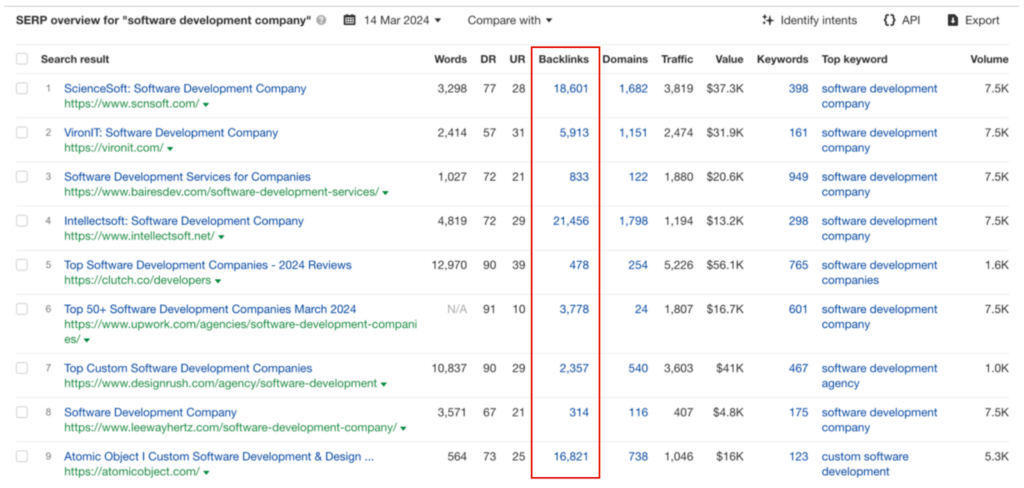
The top-ranking pages have hundreds, and often thousands, of backlinks. While other factors like content and behavioral indicators are undoubtedly important, backlinks remain a critical ranking signal.
So you just need to gain as many links as your top-ranking competitors have, right?
Wait a second. In the screenshot, you can also see that sites with fewer links often outrank those with more. Why?

Again, there may be several factors at play, but the most likely one is — link quality trumps quantity.
A single link from a high-authority website in your industry holds significantly more weight than multiple links from irrelevant, low-quality sources.
Summing up, one doesn't need to secure thousands of links to outrank the competition. What you need is a perfect combination of quality content and highly relevant backlinks pointing out to your site.
🚨 Important note: To estimate the relative authority of a website, you may look at third-party domain authority scores by Ahrefs (DR), Moz (DA), or Semrush (AS). But these aren't absolute measures of a website's true value. For instance, a new website with great content and growing traffic might have a low authority score initially, simply because it hasn't built up a strong backlink profile yet. At the same time, some sites artificially inflate their authority scores with manipulative link-building and tactics aimed at gaming algorithms of major SEO platforms (but not Google’s).
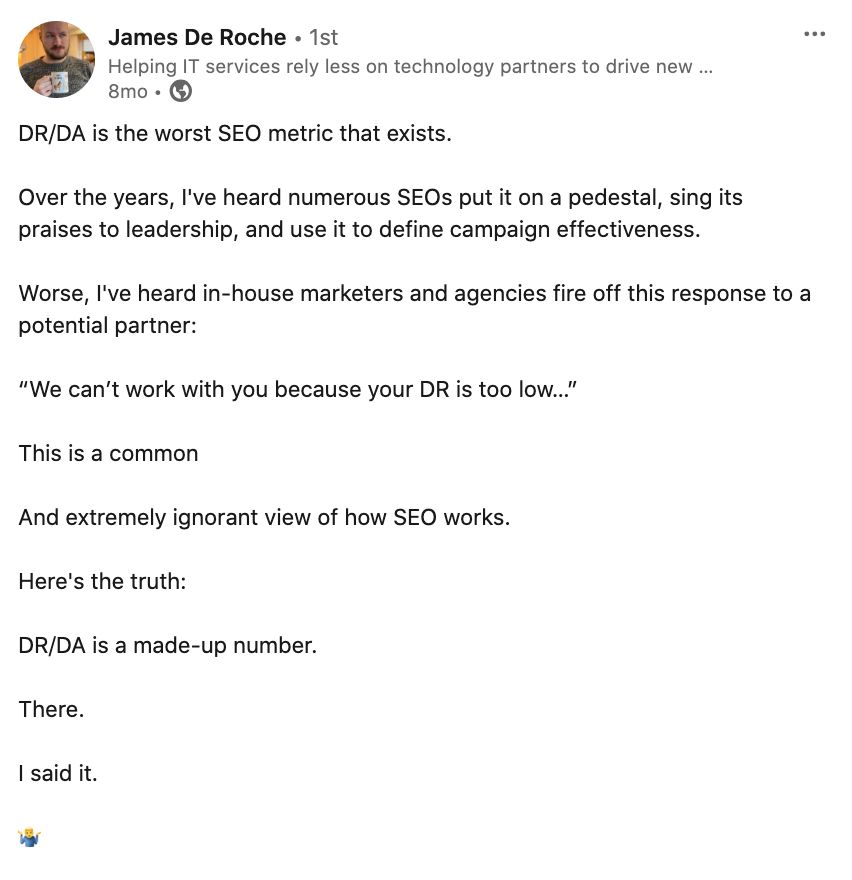
What You Need to Start Building Links for Your Startup
You want to earn those high-quality links for your site. Where do you start?
Prepare your website
Before diving into link building, ensure your website is a worthy destination. Issues like slow load speed or poor content will make link building an uphill battle — like patching a leaky boat, it just won't hold.
First, make sure your site loads quickly, is easy to navigate, and looks great on mobile devices. A positive user experience makes websites much more likely to share your content.
To make it easier to build links to your site, create in-depth, informative content that solves real problems for your target audience (and doesn’t sell). Focus on long-tail queries that are relevant to your niche, but don’t carry commercial intent. Later, you’ll use these pages to build up your link profile as it's often difficult to build links directly to your homepage and other commercial pages.
And don't forget the basics of on-page SEO. Use relevant keywords throughout your content but avoid stuffing them in unnaturally. Keep your title tags and meta descriptions clear and concise.
Analyze your competitors’ link profiles
How did your competitors climb to the top?
With the help of an SEO tool (in my opinion, Ahrefs has the best backlink data), analyze your competitors’ link profiles and try to figure out what they do to earn those links.
In case you aren’t sure who your search competitors are (yeah, they may be different from the ones you have on your list), enter your target keywords into the search box of your SEO tool one by one. You'll get a list of relevant sites along with key metrics:
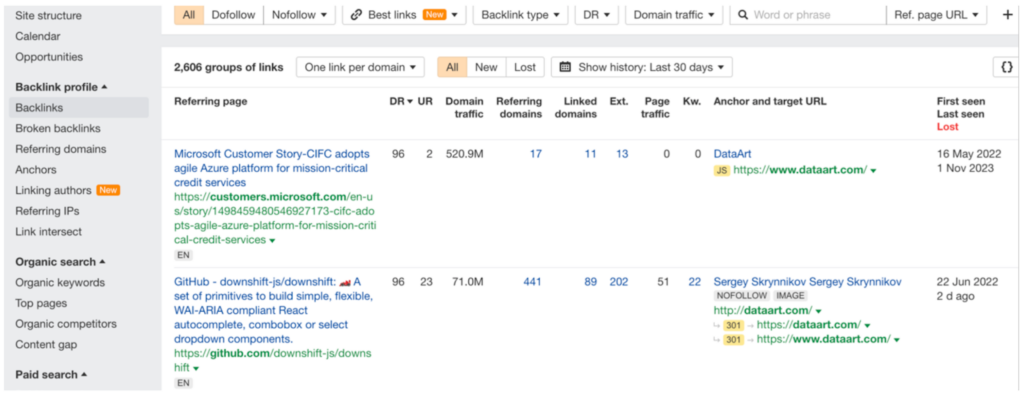
Start investigating the sites with the highest number of backlinks. In Ahrefs, clicking on a competitor takes you to their Domain Overview. From there, dive into their Backlinks report to see a full list of links pointing to their site.
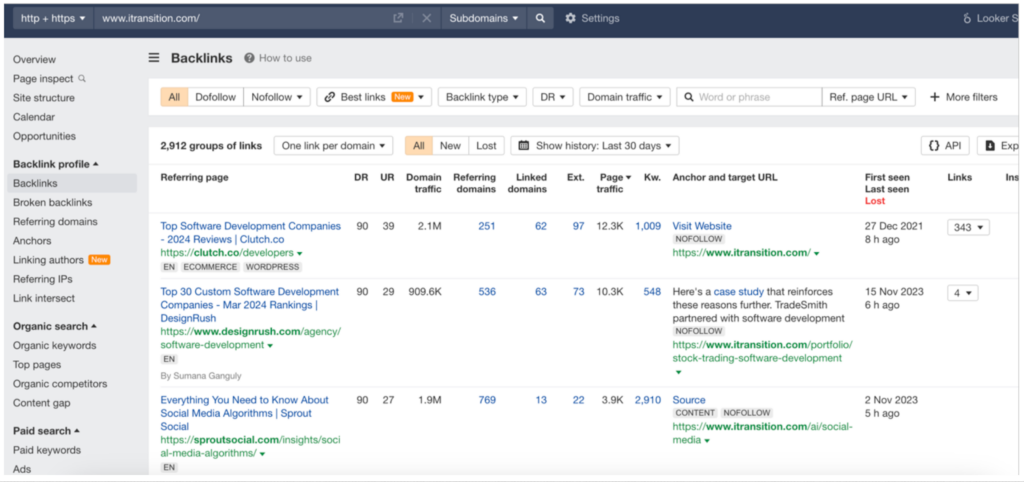
When analyzing your competitors' link profiles, there's a wealth of data to uncover: their top link sources, the ratio of dofollow and nofollow links, and even links shared by multiple competitors. For a detailed instruction on this process, check out my comprehensive guide to competitor backlink analysis.
🚨 Important note: Replicating your competitor’s strategy only works if you're on a relatively equal footing. Studying a giant in your niche won't provide the insights or tools you need to succeed as a startup in 2024.
If you aren’t a blitzscaling company, can’t raize $225M and can’t time travel back to 2015-2017…
This isn’t going to work for you, friend
Develop a link building plan
It’s time to map out an action plan. To get tangible results as fast as possible, you need to envision your path to success and stick to it.
Your link building plan should answer the following questions:
- What pages do you want to build links to?
- What keywords do you want to rank for with these pages?
- How many links do you need to reach the first page of search results with each page?
- What’s your monthly budget for the project?
- What link building technique(s) are you going to use? (I’m covering the best strategies below)
Finally, outline a timeline for your plan. Predicting progress in link building can be tricky, especially in the beginning. You may need to adjust your timeline after the first month as you get a better sense of the pace.
Need results faster? You can entrust link building to our team. We at Editorial.Link help startups build up link profiles and achieve their SEO goals within months. Read our clients’ success stories.
A few more things to know before you start:
- Technically, link building is forbidden by Google. But everyone does it. To steer clear of penalties, avoid direct link exchanges (I link to your site and you link to mine in exchange), keep your anchor texts diverse and natural, and avoid building links from websites that have too many outbound links.
- Don’t get blinded by DA (Domain Authority). Quality, topically relevant sites with low or moderate DA can be more beneficial to your link profile than sites with inflated DA.
- Your main goal is to earn dofollow links — these are the links that pass authority from the linking website to yours. Nofollow links are critical to creating a natural-looking link profile though. So if there’s a chance to gain a nofollow link with minimal effort, don’t neglect it.
Most Effective Strategies for Startups Link Building
You’ve got a new website with little to no links. What strategy should you apply to build up your link profile from scratch?
Below I've shared the five best strategies that are relatively easy to implement, even for websites just starting out.
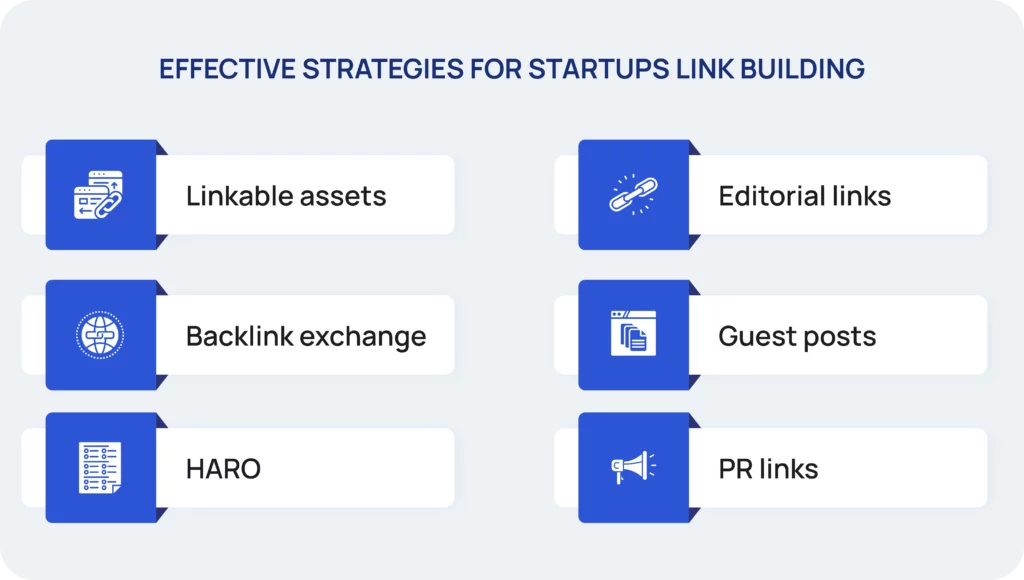
Linkable assets
The hard truth is, site owners aren’t eager to link directly to your product or service pages. To build links at scale with minimal investment, you need linkable assets.
Linkable assets are pieces of content specifically designed to attract backlinks from other websites. Unlike commercial content, which primarily promotes products or services, linkable assets focus on delivering engaging or informative content.
Examples of linkable assets include:
- In-depth guides and tutorials
- Original research and data
- Infographics and visual assets
- Interactive tools or calculators
- Spreadsheets or templates
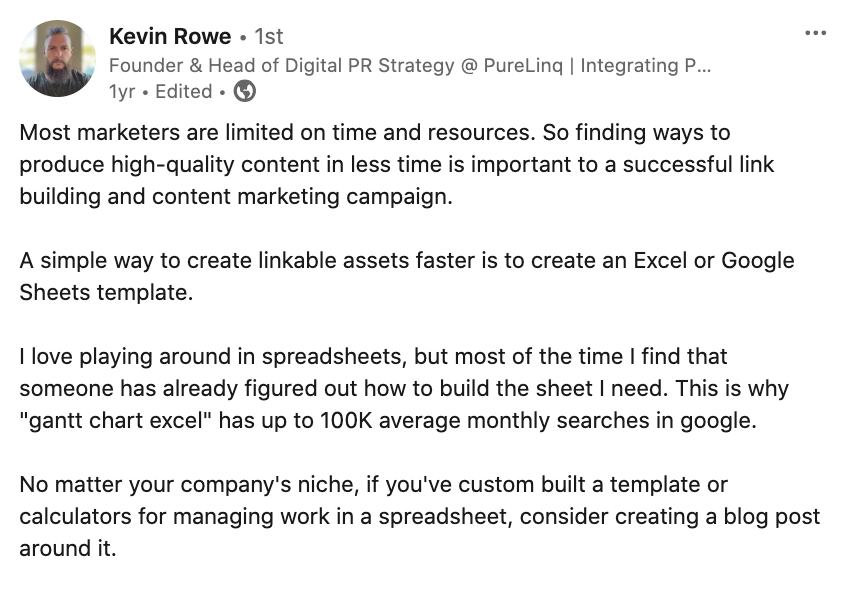
In my experience, statistics roundups are one of the most effective linkable content types. Just look at this recent article on Monday.com — it includes four links to statistics, including this one:
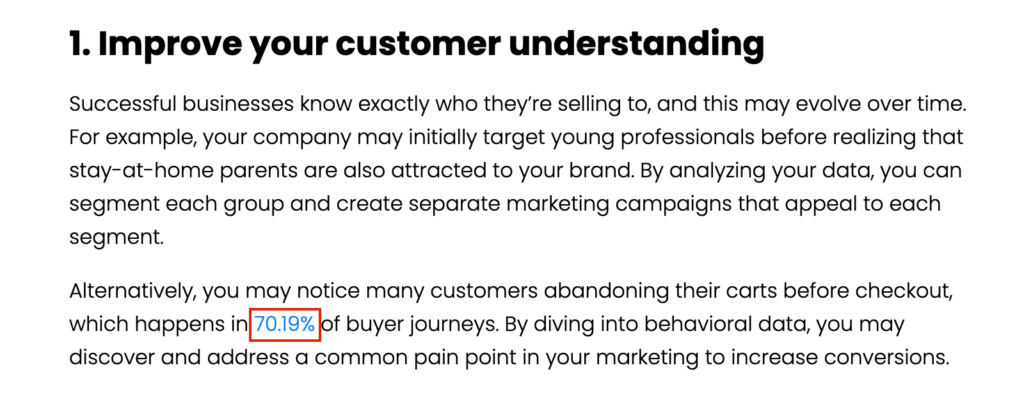
At first, it seems like original research, but when you click through, you find a massive roundup of cart abandonment statistics from various sources. And get this — that simple roundup has earned thousands of backlinks:

So how do you improve the rankings of your target commercial pages when you build backlinks to linkable assets?
Internal linking is the answer. By strategically linking from your linkable assets to your target commercial pages, you pass some of that "link juice" and authority inward.
🚨 Important note: Even the best linkable assets won't attract links on their own (especially in the beginning). You'll need to put some effort into initial promotion to get them noticed by your audience. Therefore, for maximum results, combine linkable assets with one or more of the strategies suggested below.
Backlink exchange
"But didn't you say Google frowns upon link exchanges?"
Yes, I did. That's why I don't recommend direct, one-for-one exchanges (yet if you do it once in a while, it won’t hurt). Instead, opt for a three-way, or ABC, link exchange.
Here’s how it works:
- Website A (your site) needs a link from website B.
- You find website C (relevant to your niche, too) that will link to website B.
- In exchange, you link to website C from website A.
To scale this strategy, you'll need a vast network of potential link-building partners. While building that network takes effort, this approach is still less resource-intensive than other link-building methods.
HARO
HARO (Help a Reporter Out), now rebranded as Connectively, offers journalists a platform to find relevant subject matter experts (SMEs). For link builders, it presents an opportunity to earn backlinks by contributing valuable insights to articles.
Here's how it works:
- Create an account and specify your areas of expertise.
- Browse journalist requests based on topic, keyword, or deadline.
- If a request aligns with your expertise, craft a compelling pitch.
- If your contribution is chosen, you'll be mentioned in the article, often with a link back to your website.
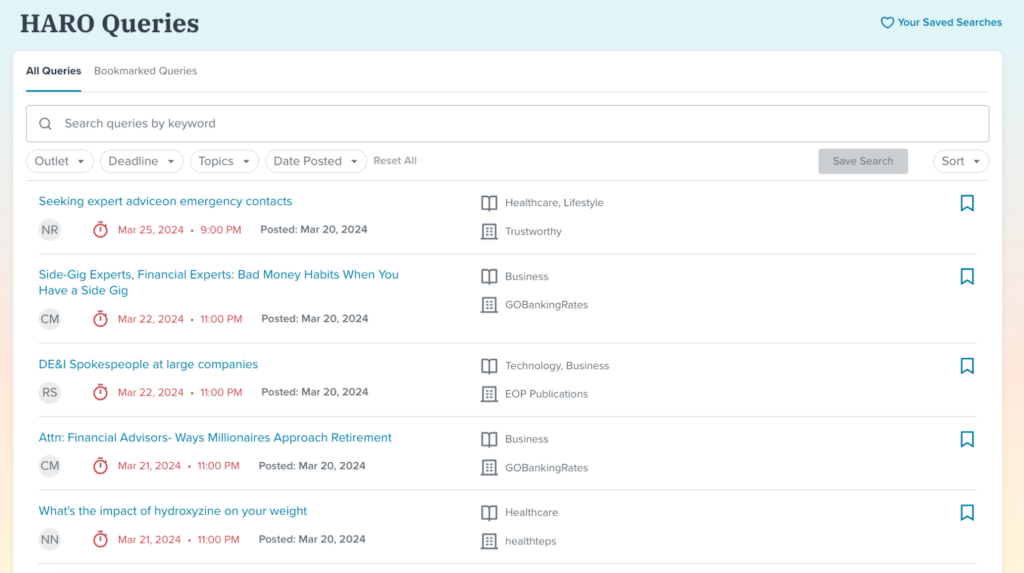
The best thing about HARO link building is its potential to help new or low-authority websites earn backlinks. Many journalists prioritize expertise over a website's established reputation, which is particularly beneficial for startups. If you haven’t built up your site’s authority yet, you won’t have to face an objection common among webmasters.
However, HARO's biggest drawback is its saturation with spammy link builders. This, combined with the rise of AI-generated content tools like ChatGPT, has significantly lowered the quality of submissions.
As a result, many journalists are turning to platforms like Featured (formerly Terkel), Qwoted, and others. While these alternatives may have higher costs or stricter requirements, they generally offer better quality opportunities.
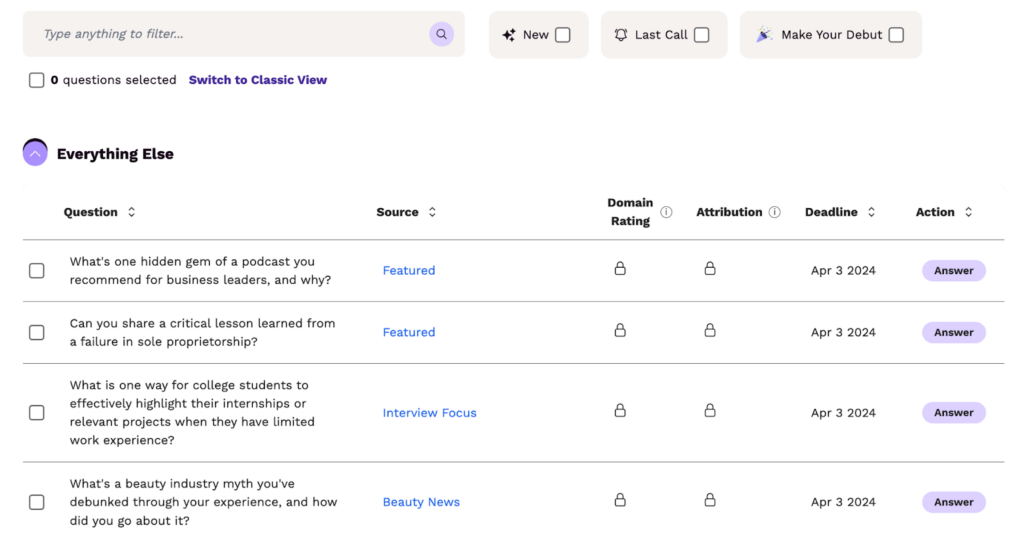
Editorial links
Editorial links are natural backlinks from reputable, high-authority websites within your industry. These links often come from articles and listicles.
When editorial links are included in content that’s already been live for a while, they’re called niche edits. They carry even more weight as the content has likely already proven its value, both to users and search engines. Niche edits blend seamlessly into existing articles, providing a natural, contextual link.
Editorial links are the most valuable for your link profile, but they’re also the hardest ones to gain. Therefore, it’s best to partner with an agency to earn editorial links consistently.
You might have guessed from our name — we specialize in earning high-quality editorial links for startups of all sizes. Get in touch to discover how we can help you outrank the competition.
Guest posts
Guest posting involves writing content for other websites in your niche in exchange for a link back to your website. It’s a time-tested strategy that benefits startups and established businesses alike.
Unlike HARO link building, guest posting allows you to choose the anchor text for your link. This gives you significantly more control over how your website appears in search results.
The approach has a significant drawback though — you’ll spend hours producing a guest post only to win one more linking domain.
The good news is, there's a way to squeeze more value from your guest posts. Consider combining guest posting with strategic backlink exchanges. Within a single guest post, you can place links to a few different partners, and in return, get several reciprocal links back to your own site.
PR links
Another great link-building technique for a startup is PR link building. The strategy adopts public relations tactics to earn high-quality backlinks from reputable news outlets, industry publications, and relevant blogs.
While it may sound like something only accessible to big brands, it’s just another common misconception.
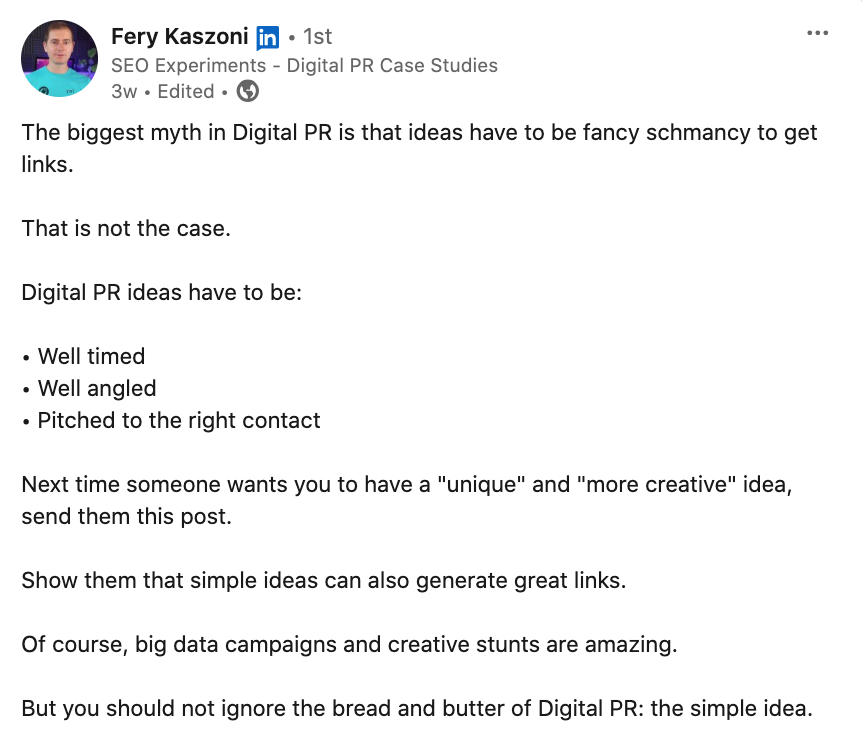
If Fery Kaszoni says PR link building doesn’t have to be fancy, it really doesn’t. So how do you make PR link building work for your startup?
One of the most effective techniques to drive PR mentions is called newsjacking — it involves finding a unique angle to capitalize on current trends and news events. However, breaking news isn't the only route to successful PR link building.
Almost any type of linkable asset can become a great pitch idea. Journalists particularly like original research, and startups often excel at creating compelling studies.
Take the Searchshark study on dangerous pop culture search terms. This unique research earned 75 inbound links, including high-quality mentions from pcmag.com and indy100.com.
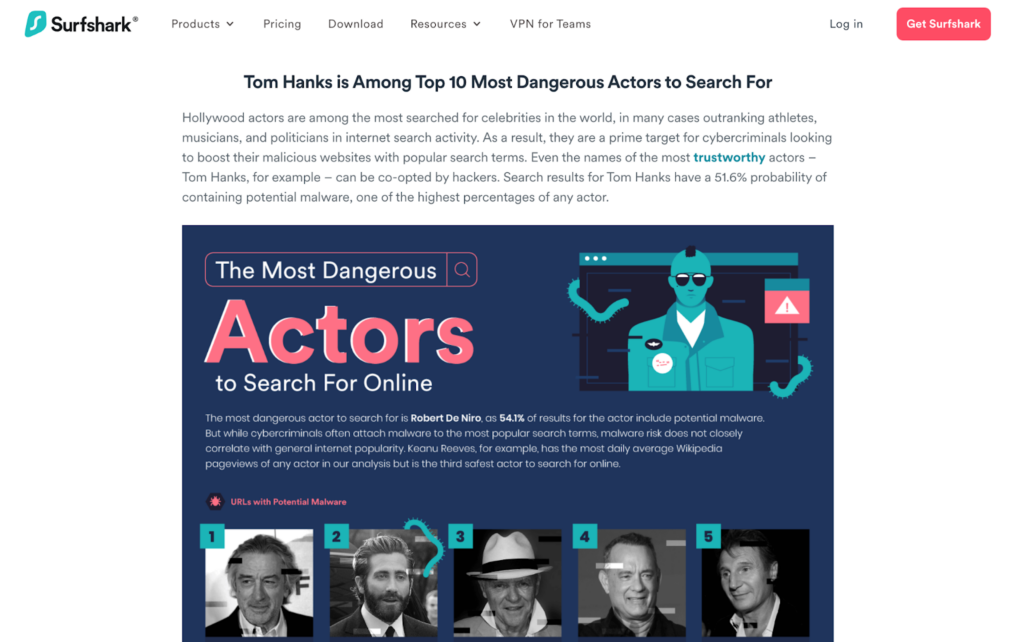
What Backlinks You Should Avoid for Startups
All of these sound like a lot of time and money. Why overcomplicate things?
So you see your competitors have thousands of links. You google “buy links” and the first search result is the Fiverr page offering you all sorts of freelance link builders offering hundreds of backlinks for a few euros. Apparently, you don’t need all the sophisticated strategies from above to secure quality links!
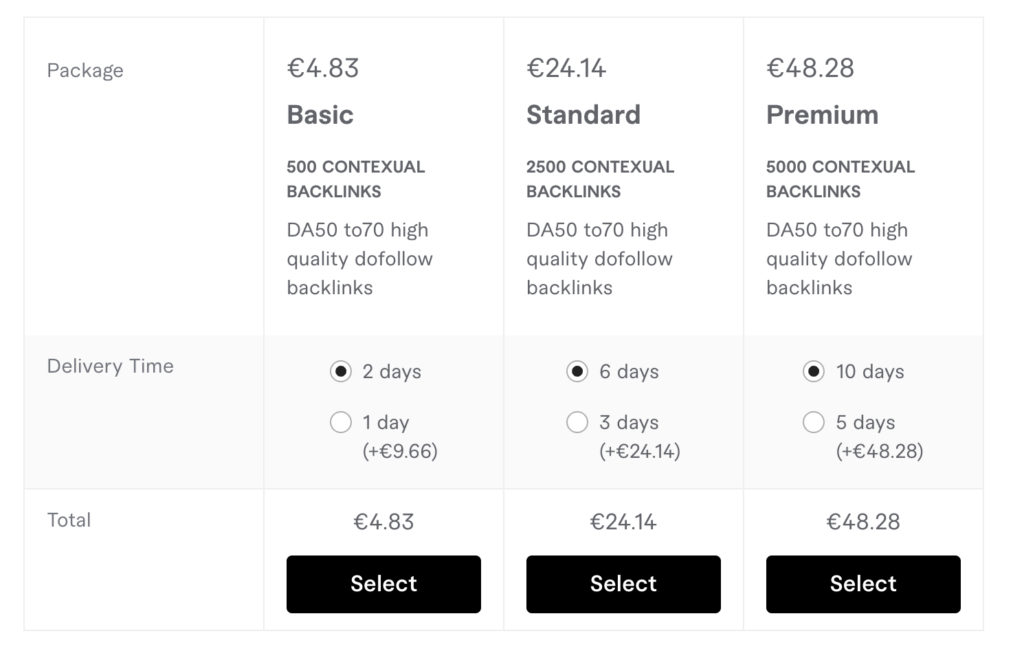
Well, before making any conclusions, let’s look into the sources these links usually come from:
- Forums are a prime target for spammers who try to sneak links into discussions. While it’s quite possible to drive traffic and even leads with forum links, it most certainly doesn’t cost 5 euros.
- Link farms are networks of often poorly designed websites with thin, low-quality content. Sites within the link farm network primarily link to each other.
- PBNs (Private Blog Networks) are collections of websites designed to artificially boost the rankings of other sites. PBN owners put more effort into making them appear like legitimate websites. The sites in the network mainly link to the "money site" the PBN was built to support.
Unfortunately, anyone hoping to improve their search rankings won't find truly valuable backlinks for such a low price. Buying cheap backlinks is a gamble for any business that relies on search results. At best, you'll waste your money on links that do nothing. At worst, you'll trigger a Google penalty that can damage your search rankings.
How to Choose Authority Link Building Service for Startups
Building links is one of the most resource-intensive parts of SEO. Given that you definitely have a lot on your plate right now, it’s best to outsource link building to professionals.
Here's what to look for when choosing a reliable link-building partner for your startup:
✅ Proven track record. Look for case studies demonstrating the agency's success in building links for startups. Do they have experience in your niche?
✅ Positive reviews. Check independent platforms for reviews from past clients.
✅ Expertise and transparency. The agency should be able to clearly explain their approach and be transparent about strategies and tactics they'll use.
Editorial.Link checks all the boxes. Our experts help startups build high-quality link profiles for sustainable search growth. We focus on building strong relationships with high-authority websites, with no shady link-building practices and schemes. Let’s discuss your project!


